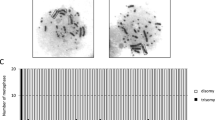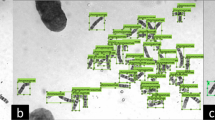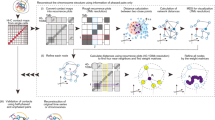Abstract
THE karyotype of a somatic cell is the pattern obtained by the arrangement of the chromosomes into various groups by length and centromere position. The average forms of all chromosomes of a complement are defined by an idiogram, based on a large number of karyotypes. The human diploid idiogram was standardized at the Denver1 and London2 conferences on human chromosomes. By comparing normal or near normal karyotypes with the standard, it is possible without any supporting genetic data to identify changes in chromosome structure. When the cells have been taken directly from the diploid organism or when they have been in culture for only a short time, it is legitimate to ignore the numerous small shape differences, such as variations in coiling or artefacts, from the Denver–London idiogram. But when a cell population is known to be distantly descended from the parent diploid—for example, when it has been long in culture—and if the chromosome complement has changed both numerically and structurally, then comparison with the diploid idiogram is more difficult. Changes in chromosome structure are likely to have been numerous, and shape alone is not a valid criterion for chromosome identification.
This is a preview of subscription content, access via your institution
Access options
Subscribe to this journal
Receive 51 print issues and online access
$199.00 per year
only $3.90 per issue
Buy this article
- Purchase on SpringerLink
- Instant access to full article PDF
Prices may be subject to local taxes which are calculated during checkout
Similar content being viewed by others
References
Denver Conf. Rep., Lancet, i, 1063 (1960).
London Conf. Rep., Cytogenetics, 2, 264 (1963).
German, J. L., Evans, V. J., Cortner, J. A., and Westfall, B. B., J. Nat. Cancer Inst., 32, 681 (1964).
Belcher, R. J., thesis, Univ. London (1970).
Hughes, D. T., Nature, 217, 518 (1968).
Epstein, M. A., and Barr, Y. M., Lancet, i, 252 (1964).
Epstein, M. A., and Barr, Y. M., J. Nat. Cancer Inst., 34, 241 (1965).
de Grouchy, J., and Cottin, S., Rev. Franc. Etud. Clin. Biol., 6, 928 (1961).
Author information
Authors and Affiliations
Rights and permissions
About this article
Cite this article
BELCHER, R. Chromosome Analysis of Abnormal Cells. Nature 231, 387–388 (1971). https://doi.org/10.1038/231387a0
Received:
Revised:
Issue date:
DOI: https://doi.org/10.1038/231387a0
This article is cited by
-
Variation of stemline karyotype in a HeLa cell line
Zeitschrift f�r Krebsforschung und Klinische Onkologie (1975)
-
Chromosomes and DNA-replication of rat kangaroo cells (PtK2)
Chromosoma (1972)
-
Chromosome Analysis of Abnormal Cells
Nature (1971)



